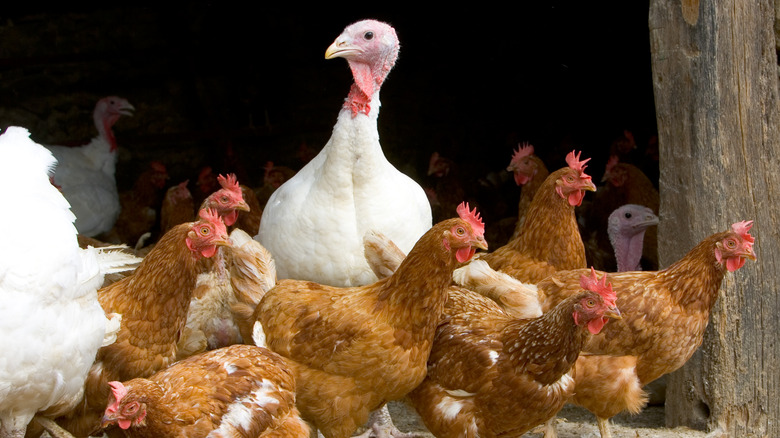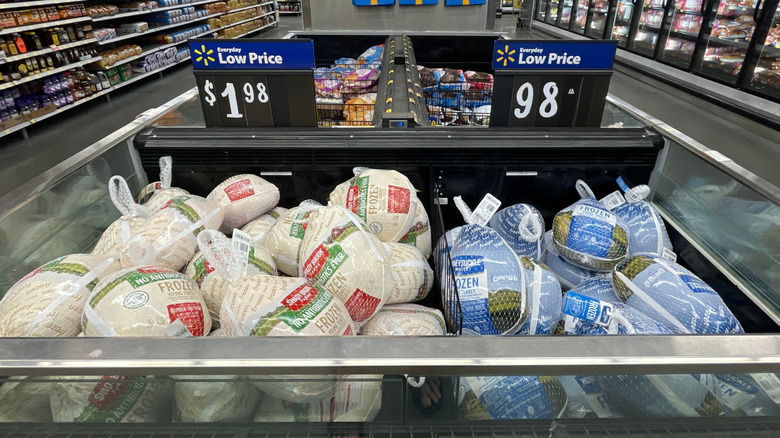Why Don't We Eat Turkey Eggs?
Given that turkey eggs can be almost double the size of chicken eggs — up to 115 grams versus 50 grams — and are said to be creamier than the eggs produced by chickens, it might seem strange that so few people eat turkey eggs. But the reason that people usually make a perfect omelet out of chicken eggs, and not turkey eggs, has nothing to do with turkey eggs being inedible — and everything to do with them being less economical than chicken eggs.
Although plain ol' chicken eggs may seem spendier than normal (around $3.65 per dozen in late 2024), those cartons still cost less per egg than a turkey eggs do. Turkey eggs cost between $2 and $3 per egg, or as much as $36 for a dozen of them. Unless you're solely looking for a novelty experience, similar to the kind you'd have if you decided to eat an ostrich egg, there are few reasons to eat turkey eggs over chicken eggs. They simply cost too much to make them viable, long-term breakfast options.
Why do turkey eggs cost so much?
Turkeys lay about 100 eggs per year. That breaks down to about two eggs every week. Your average chicken, on the other hand, produces about two-and-a-half times that amount in a year, or around 250 eggs. Extraordinary hybrid breeds of chickens have been known to lay between 300 and 350 eggs per year. Basically, you get fewer turkey eggs from a single turkey than you would from its smaller comrade.
A turkey's gestation period is longer, too. A chicken is ready to start laying eggs at five months, but a turkey won't be ready until at least month seven. Once the turkey is ready to lay her eggs, it'll take at least two weeks for her to produce the eggs she's going to lay in that batch, so to speak. She doesn't even begin to sit on the nest until the egg-laying period is over. After that, the bird sits on the nest for another 28 days.
Since a turkey only produces about two eggs a week, that means she'll have a total of four eggs that could become live turkeys after this six-week stint is through. (That's two weeks to produce the eggs and another four weeks to produce live birds.) Fewer birds produced at the end of the 28-day gestation period means fewer birds to produce eggs down the road. And fewer eggs mean bigger costs.
The bottom line on turkey eggs in grocery stores
Because they're bigger, turkey eggs cost more when it comes to upkeep. Consider a small farm that raises around 30 turkeys per year. The cost of a single baby turkey costs the farmer $3. It'll cost $30 to feed a single turkey and over $23 to process the turkey. It takes four months to get just one full-grown turkey for that farm. That's over $50 per turkey, not including additional labor fees.
Even for big-box stores like Walmart, producing turkeys may cost just as much. However, unlike the small farmer who probably charges somewhere around $50 for the turkey, frozen turkeys that are sold at big stores around Thanksgiving and other holidays are basically loss leaders. A loss leader is an item that a store sells at a loss just to get people to enter a store. Essentially, big stores hope that people come in to buy a turkey, and leave with not only the turkey, but also the makings for stuffing, cranberry sauce, frozen corn, wine, and dessert to go with the dinner. It's basically an advertising cost for big vendors like these.
Small farms are worth mentioning in this comparison because those are also the outfits that are likely to produce the turkey eggs you'll find at farmer's markets. You're not likely to find turkey eggs in big stores, like Wally's. In the end, it costs more for producers of turkey eggs to get their eggs to market, so it's going to cost you more to get them on your table. It's supply and demand through and through.


